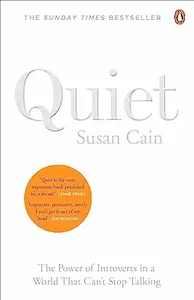Quiet - Summary
Susan Cain

Introduction
In her book “Quiet: The Power of Introverts in a World That Can’t Stop Talking,” Susan Cain explores the often-overlooked strengths of introverts in a society that values extroversion. Cain argues that introverts have unique talents and abilities that are often overshadowed by the loud and outgoing personalities that dominate our culture. Through a combination of research and personal anecdotes, Cain makes a compelling case for the importance of introverts in our society.
The Myth of the Extrovert Ideal
Cain begins her book by examining the “extrovert ideal” that dominates our culture. She argues that our society values outgoing, confident, and assertive personalities, while viewing introverts as shy, awkward, and even socially inept. This bias towards extroversion, Cain argues, has led to a number of negative consequences, including a lack of diversity in leadership and a failure to recognize the unique strengths of introverts.
The Power of Introverts
Despite the bias towards extroversion, Cain argues that introverts have a number of unique strengths that are often overlooked. For example, introverts tend to be excellent listeners and deep thinkers, which can make them valuable in fields such as science, writing, and the arts. Additionally, introverts often have a strong sense of empathy and are able to connect with others on a deep level.
The Biology of Introversion
Cain also explores the biological basis of introversion, arguing that it is a natural and normal personality trait that is present in a significant portion of the population. She cites studies that show that introverts have a more sensitive nervous system than extroverts, which can make them more easily overwhelmed by stimulation. This sensitivity, however, can also lead to a greater capacity for creativity and deep thinking.
The Extrovert Ideal in Education
Cain argues that the extrovert ideal is particularly prevalent in our education system, which often values group work and participation over individual learning. This bias, she argues, can be detrimental to introverted students, who may struggle to thrive in a classroom environment that is geared towards extroverts. Cain suggests that educators should be more mindful of the needs of introverted students and provide them with opportunities to learn in ways that suit their unique strengths.
The Extrovert Ideal in the Workplace
Cain also examines the impact of the extrovert ideal in the workplace. She argues that many workplaces are designed to reward extroverted personalities, with open-plan offices, brainstorming sessions, and team-building exercises all favoring those who are outgoing and assertive. This bias, Cain suggests, can lead to a lack of diversity in leadership and a failure to recognize the unique strengths of introverts.
The Power of Solitude
One of the key strengths of introverts, Cain argues, is their ability to thrive in solitude. Introverts often need time alone to recharge and reflect, which can lead to greater creativity and productivity. Cain cites a number of examples of successful introverts who have used solitude to their advantage, including writers, artists, and scientists.
The Importance of Quiet
Cain also explores the importance of quiet in our lives, arguing that we often undervalue the benefits of silence and solitude. She suggests that we should make more of an effort to seek out quiet spaces and moments of solitude, which can help us to recharge, reflect, and connect with our inner selves.
The Role of Introverts in Leadership
Despite the bias towards extroversion in leadership, Cain argues that introverts can be highly effective leaders. Introverts often have strong listening skills and are able to connect with others on a deep level, which can make them effective at building relationships and inspiring others. Additionally, introverts tend to be more thoughtful and reflective, which can lead to better decision-making.
The Power of Collaboration
While Cain emphasizes the importance of solitude and individual work, she also recognizes the value of collaboration. She argues that introverts can be highly effective collaborators, but that they often need to work in ways that suit their unique strengths. For example, introverts may prefer to collaborate in smaller groups or to work independently before coming together to share their ideas.
The Importance of Valuing Introverts
Cain concludes her book by emphasizing the importance of valuing introverts in our society. She suggests that we need to recognize the unique strengths of introverts and provide them with opportunities to thrive. This may involve rethinking the way we design our schools and workplaces, as well as challenging the bias towards extroversion that dominates our culture.
Conclusion
In “Quiet: The Power of Introverts in a World That Can’t Stop Talking,” Susan Cain makes a compelling case for the importance of introverts in our society. Through a combination of research and personal anecdotes, Cain argues that introverts have unique talents and abilities that are often overlooked in a culture that values extroversion. By recognizing and valuing the strengths of introverts, Cain suggests that we can create a more diverse and inclusive society that benefits everyone.